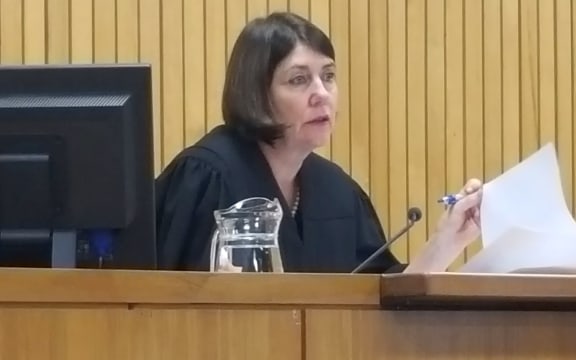The Department of Corrections has been ordered to pay more than $172,000 in reparations to family members of a man killed while doing community work.
Robert Cave, 26, was crushed by a log while working at a church property south of Nelson in 2014.
WorkSafe says it is the largest reparation order for any of the cases it has brought to court.

Judge Jan-Marie Doogue at today's sentencing Photo: RNZ / Tracy Neal
Today's three-hour sentencing in the Nelson District Court was marked by tearful statements by stricken family members.
Chief District Court Judge Jan-Marie Doogue said, under the circumstances of the community work placement, Mr Cave could not have refused to be in a hazardous place.
She said Corrections' failure was systemic rather than wilful, and it had failed to address the risks posed to Mr Cave.
The department was found guilty in September on the charge of failing to take all practicable steps to ensure Mr Cave's safety during his placement on the church property in Wakefield.
The 26-year-old father of four, who was expecting his fifth child at the time, was crushed by a log he and another man were cutting with a chainsaw.
His mother, Gail Denton, told the court her son's death had fractured the whole family.
"Robert was, and still is, the influence in our lives. He was my 'go-to person' but nothing can bring him back," she said.
She said his death was neither fair, nor right.
Later, outside court, Ms Denton said the family was satisfied with the outcome and that it was a resolution at last.
The victim impact statement of Mr Cave's widow was read on her behalf by WorkSafe lawyer DeAnne Brabant. The statement told of her grief at her loss, and how she resorted to drugs, which in turn alienated her from family and friends.
She had cried for their unborn child, and over the "world which had been ripped from me".
"I was sick with grief, I isolated myself and became depressed. I used to think it was all just a fantasy and that one day he would come home - that it was all just a joke."
She spoke of the spiral of self harm, and how she had to carry on for the sake of their unborn child.
"I turned to using drugs to ease the pain. Life was getting out of control so I moved back to my home town to get support. I had lost myself and I had also lost the trust and love of the people closest to me," her statement read.
The woman has been attending drug rehabilitation after she admitted herself into treatment.
The reverend on whose property the accident happened said in a statement he had felt misinformed about the pair's fitness for their assigned task.
He was also left exasperated by the intensive questioning afterwards, and felt unsupported by Corrections throughout the ordeal.
Another lawyer for WorkSafe, Dale La Hood, described what happened as a "wholesale system failure" by a Crown organisation entrusted with responsibility for people carrying out duties they had no choice over.
It would not have taken much to identify gaps in the process and fix them, he said.
A lawyer acting for Corrections, Brian Nathan, said the department had taken steps immediately afterwards to contact the relevant people, arrange for family members to travel to Nelson and provide information to ACC.
Mr Nathan said the department, in response to criticism, conceded it could have done more.
He said the organisation was working in an adversarial situation with underlying tensions, which made it difficult to manage.
Judge Doogue said during sentencing that money was no measure for someone's loss, but was designed to give a measure of recognition for what had happened.
"It cannot be a tariff for the loss of life," she said.
She ordered reparations of $155,000 for emotional harm to the victim's family, and a further $17,471.12 to the victim's father for financial losses. There was a reserved judgement on reparation for one other party claiming emotional harm.
Under law, a government agency can not be fined, but Judge Doogue said she would have imposed a fine of $84,000 if she had been able to do so.
WorkSafe chief inspector Keith Stewart said in a statement there were three key lessons from this tragic case.
Corrections needed to ensure risks to offenders undertaking community work were assessed, particularly in relation to hazardous work, he said.
Appropriate safety precautions needed to be put in place, and it also needed to ensure effective monitoring of offenders working with organisations during placements.
He said Corrections had taken steps to improve its processes since the accident.


